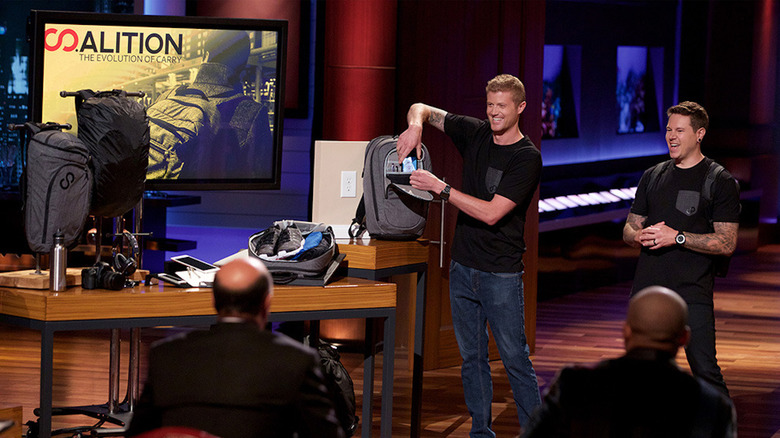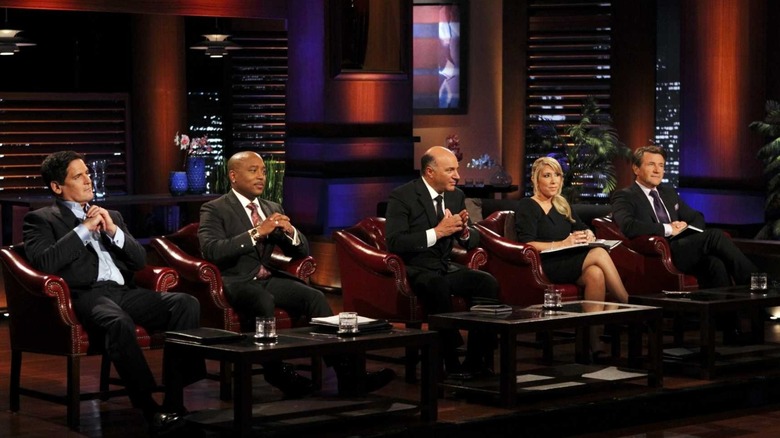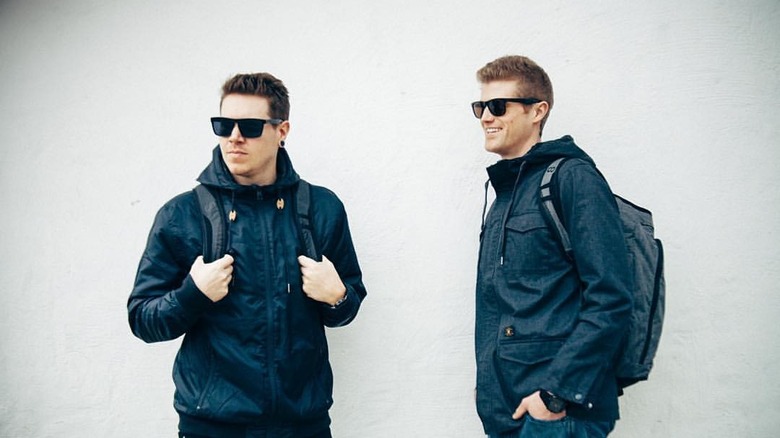What Really Came Of CO.ALITION From Shark Tank?
ABC's hit reality show "Shark Tank" largely tries to focus on success stories, but there are still pitches that turn into peek-through-your-fingers car wrecks. The multi-millionaire Sharks seek to invest their cash in start-ups, but they can be merciless when confronted with poorly thought-out presentations or numbers that don't add up — and some people simply fold under scrutiny.
In 2016, there was drama in Season 7, Episode 15 when Jeff Popp and Casey Lorenzen strolled into the studio to deliver a boyish pitch for CO.ALITION, a backpack range featuring an integrated battery pack for mobile devices and an inbuilt wireless hard drive. Despite raising chuckles with their cheeky presentation, it was evident from the frowns among the tycoons that there were doubts about the product from the get-go.
Kevin "Mr. Wonderful" O'Leary honed in on the main issue: With no patent, what was stopping someone else from coming along and sticking a power source and a hard drive into a competing bag? Popp and Lorezen's prospects looked in further peril when they revealed that they ran a separate company producing a different line of bags, which had already enjoyed success to the tune of $1.2 million in sales. Why on earth were they creating a new company for a similar product?
After their cocksure introduction, the CO.ALITION co-founders suddenly looked like a pair of seals with a shiver of great whites bearing down on them. Did they pivot and save the pitch or get eaten alive?
What happened to CO.ALITION on Shark Tank?
Denver-based bag designers Jeff Popp and Casey Lorenzen dove into the "Shark Tank" to ask for a $200,000 investment in exchange for 20% equity in CO.ALITION. With a product that looked suspiciously like a regular backpack with some tech sewn into it, Popp rallied against the criticism by highlighting that their bag's power source — which was regulated by a computer chip — could be charged without removing it. This extra feature still didn't thrill the Sharks, and they were equally unimpressed by the numbers. In seven months, CO.ALITION had only shifted 500 units with a revenue of $100,000.
Dallas Mavericks owner Mark Cuban was the first to go, alarmed that the boys had set up a separate company that might take away focus from their more well-proven business. Tech tycoon Robert Herjavec, who couldn't see the company's future vision, followed suit before venture capitalist Kevin O'Leary took a firm line. He offered the entrepreneurs a chance to reboot their pitch before they were "thrown out" of the studio with no deal.
With Lorezen looking shellshocked, Popp wisely took the hint and pivoted to an offer of $300,000 in return for a larger slice of 30% in both companies. The revised pitch still didn't address concerns about the uniqueness of the bag, and both O'Leary and home shopping innovator Lori Greiner also dropped out. That just left FUBU founder Daymond John, who considered making an offer before sending the guys home empty-handed.
What happened after Shark Tank?
The failure of CO.ALITION in Season 7 of "Shark Tank" highlighted the dangers of going into the studio without a fully developed product, a sound grasp of business and finances, and a compelling vision for the future. Nevertheless, the popularity of the show always has the potential to boost sales. According to a May 2016 Outside piece, Popp told the outlet the experience was "valuable exposure for the brand."
Without securing a deal from any of the Sharks, the co-founders pushed forward and targeted a young and tech-savvy audience via social media marketing. The following year, CO.ALITION received positive attention when the bags were featured in a Forbes article suggesting gift ideas from "Shark Tank" for Father's Day. That boost was short-lived, however, and the company folded a couple months later. That left Jeff Popp and Casey Lorenzen to focus on their other bag company MHM, which is still in business today.


